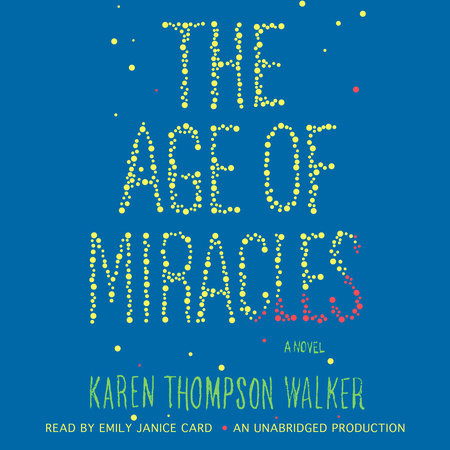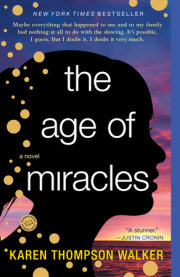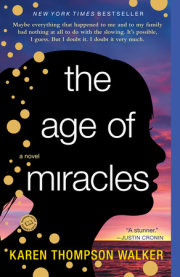1.
We didn’t notice right away. We couldn’t feel it.
We did not sense, at first, the extra time, bulging from the smooth edge of each day like a tumor blooming beneath skin.
We were distracted, back then, by weather and war. We had no interest in the turning of the earth. Bombs continued to explode on the streets of distant countries. Hurricanes came and went. Summer ended. A new school year began. The clocks ticked as usual. Seconds beaded into minutes. Minutes grew into hours. And there was nothing to suggest that those hours too weren’t still pooling into days, each the same, fixed length known to every human being.
But there were those who would later claim to have recognized the disaster before the rest of us did. These were the night workers, the graveyard shifters, the stockers of shelves, and the loaders of ships, the drivers of big-rig trucks, or else they were the bearers of different burdens: the sleepless and the troubled and the sick. These people were accustomed to waiting out the night. Through bloodshot eyes, a few did detect a certain persistence of darkness on the mornings leading up to the news, but each mistook it for the private misperception of a lonely, rattled mind.
On the sixth of October, the experts went public. This, of course, is the day we all remember. There’d been a change, they said, a slowing, and that’s what we called it from then on: the slowing.
“We have no way of knowing if this trend will continue,” said a shy bearded scientist at a hastily arranged press conference, now infamous. He cleared his throat and swallowed. Cameras flashed in his eyes. Then came the moment, replayed so often afterward that the particular cadences of that scientist’s speech—the dips and the pauses and that slight Midwestern slant—would be forever married to the news itself. He went on: “But we suspect that it will continue.”
Our days had grown by fifty-six minutes in the night.
At the beginning, people stood on street corners and shouted about the end of the world. Counselors came to talk to us at school. I remember watching Mr. Valencia next door fill up his garage with stacks of canned food and bottled water, as if preparing, it now seems to me, for a disaster much more minor.
The grocery stores were soon empty, the shelves sucked clean like chicken bones.
The freeways clogged immediately. People heard the news and they wanted to move. Families piled into minivans and crossed state lines. They scurried in every direction like small animals caught suddenly under a light.
But, of course, there was nowhere on earth to go.
2.
The news broke on a Saturday.
In our house, at least, the change had gone unnoticed. We were still asleep when the sun came up that morning, and so we sensed nothing unusual in the timing of its rise. Those last few hours before we learned of the slowing remain preserved in my memory—even all these years later—as if trapped behind glass.
My friend Hanna had slept over the night before, and we’d camped out in sleeping bags on the living room floor, where we’d slept side by side on a hundred other nights. We woke to the purring of lawn mower motors and the barking of dogs, to the soft squeak of a trampoline as the twins jumped next door. In an hour we’d both be dressed in blue soccer uniforms—hair pulled back, sunscreen applied, cleats clicking on tile.
“I had the weirdest dream last night,” said Hanna. She lay on her stomach, her head propped up on one elbow, her long blonde hair hanging tangled behind her ears. She had a certain skinny beauty that I wished I had too.
“You always have weird dreams,” I said.
She unzipped her sleeping bag and sat up, pressed her knees to her chest. From her slim wrist there jingled a charm bracelet crowded with charms. Among them: one half of a small brass heart, the other half of which belonged to me.
“In the dream, I was at my house, but it wasn’t my house,” she went on. “I was with my mom, but she wasn’t my mom. My sisters weren’t my sisters.”
“I hardly ever remember my dreams,” I said, and then I got up to let the cats out of the garage.
My parents were spending that morning the way I remember them spending every morning, reading the newspaper at the dining room table. I can still see them sitting there: my mother in her green bathrobe, her hair wet, skimming quickly through the pages, while my father sat in silence, fully dressed, reading every story in the order it appeared, each one reflected in the thick lenses of his glasses.
My father would save that day’s paper for a long time afterward—packed away like an heirloom, folded neatly beside the newspaper from the day I was born. The pages of that Saturday’s paper, printed before the news was out, report a rise in the city’s real estate prices, the further erosion of several area beaches, and plans for a new freeway overpass. That week, a local surfer had been attacked by a great white shark; border patrol agents discovered a three-mile long drug-running tunnel six feet beneath the U.S./Mexico border; and the body of a young girl, long missing, was found buried under a pile of white rocks in the wide, empty desert out east. The times of that day’s sunrise and sunset appear in a chart on the back page, predictions that did not, of course, come to pass.
Half an hour before we heard the news, my mother went out for bagels.
I think the cats sensed the change before we did. They were both Siamese, but different breeds. Chloe was sleepy and feathery and sweet. Tony was her opposite: an old and anxious creature, possibly mentally ill, a cat who tore out his own fur in snatches and left it in piles around the house, tiny tumbleweeds set adrift on the carpet.
In those last few minutes, as I ladled dry food into their bowls, the ears of both cats began to swivel wildly toward the front yard. Maybe they felt it, somehow, a shift in the air. They both knew the sound of my mother’s Volvo pulling into the driveway, but I wondered later if they recognized also the unusually quick spin of the wheels as she rushed to park the car, or the panic in the sharp crack of the parking brake as she yanked it into place.
Soon, even I could detect the pitch of my mother’s mood from the stomps of her feet on the porch, the disorganized rattle of her keys against the door—she had heard those earliest news reports, now notorious, on the car radio between the bagel shop and home.
“Turn on the TV right now,” she said. She was breathless and sweaty. She left her keys in the teeth of the lock, where they would dangle all day. “Something God awful is happening.”
We were used to my mother’s rhetoric. She talked big. She blustered. She overstated and oversold. God awful might have meant anything. It was a wide net of a phrase that scooped up a thousand possibilities, most of them benign: hot days and traffic jams, leaking pipes and long lines. Even cigarette smoke, if it wafted too close, could be really and truly God awful.
We were slow to react. My father, in his thinning yellow Padres t-shirt, stayed right where he was at the table, one palm on his coffee cup, the other resting on the back of his neck, as he finished an article in the business section. I went ahead and opened the bag of bagels, letting the paper crinkle beneath my fingers. Even Hanna knew my mother well enough to go right on with what she was doing—hunting for the cream cheese on the bottom shelf of the refrigerator.
“Are you watching this?” my mother said. We were not.
My mother had been an actress once. Her old commercials—mostly hair care and kitchen products—lay entombed together in a short stack of dusty black videotapes that stood beside the television. People were always telling me how beautiful she was when she was young, and I could still find it in the fair skin of her face and the high structure of her cheekbones, but she’d gained weight in middle age. Now she taught one period of drama at the high school and four periods of history. We lived 95 miles from Hollywood.
She was standing on our sleeping bags, two feet from the television screen. When I think of it now, I imagine her cupping one hand over her mouth the way she always did when she worried, but at the time, I just felt embarrassed by the way the black waffle soles of her running shoes were twisting Hanna’s sleeping bag, hers the dainty cotton kind, pink and polka-dotted and designed not for the hazards of campsites but exclusively for the plush carpets of heated homes.
“Did you hear me?” said my mother, swinging round to look at us. My mouth was full of bagel and cream cheese. A sesame seed had lodged itself between my two front teeth. “Joel!” she shouted at my father. “I’m serious. This is hellacious.”
My father looked up from the paper then, but still he kept his index finger pressed firmly to the page to mark his place. How could we have known that the workings of the universe had finally made appropriate the fire of my mother’s words?
Copyright © 2012 by Karen Thompson Walker. All rights reserved. No part of this excerpt may be reproduced or reprinted without permission in writing from the publisher.










